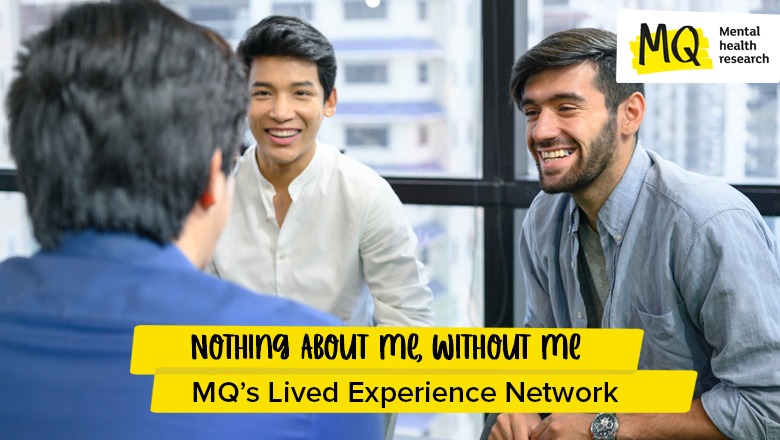[ad_1]
It is known that the highest quality research is carried out with the involvement of the very people that stand to benefit most from its findings. This is why MQ has long been an advocate of collaborative research that champions the voices and involvement of people with lived and living experience of mental illnesses.
By including lived experience experts, or LEEs, in the design of studies, in the implementation of research and in sharing the findings, not only will scientists be asking the right questions of the right people, but the research itself can be carried out in a sensitive and compassionate way. This benefits everyone as it means that questions that address the real needs will be studied using appropriate methodologies. Therefore, participants in research will feel more involved, more empowered and the results will be interpreted in a more accurate and nuanced way.
This is why MQ is proud to be launching the MQ Lived Experience Experts (LEE) Network.
MQ LEE Network is a global community of people with lived experience of having and or caring for somebody with mental health conditions who are keen to contribute to designing, shaping, and delivering mental health research. The network is kept up to date through regular e-mail bulletins, with new opportunities for involvement in different research projects, examples of involvement, as well as training and networking opportunities, conferences, and webinars.
“It is an incredible experience to be involved in MQ Mental Health research projects.” Says Benny Prawira, founder of Into The Light in Indonesia.
“MQ’s commitment to inclusivity guarantees the active contribution of both lived experience experts and subject matter experts. I am sincerely grateful for the opportunity to collaborate with such distinguished experts, enabling me to engage in enlightening discussions and novel insights from the best of both worlds. MQ also takes considerable initiative in amplifying the voices and perspectives of traditionally marginalised groups within its global network of experts. This harmonious combination not only improves the quality of the research but also leads to a more holistic comprehension of mental health issues.”
What do we mean by lived experience?
We consider anyone who has experience of living with a mental illness, either diagnosed or un-diagnosed, can be said to have ‘lived experience’ of mental illnesses. This includes the carers of people with mental illnesses.
‘Living experience’ is a phrase often used interchangeably with ‘Lived Experience’ and refers to someone with ongoing symptoms.
People with lived or living experience of mental illnesses have unique insights that they can share with scientists and researchers to help them focus research on what is most important and to carry out research in a compassionate way.
What will the MQ Lived Experience Experts (LEE) Network do?
MQ carries out and supports a wide range of research activities all around the world. Each project can benefit from the involvement of LEEs.
This involvement can include designing, carrying out, and/or disseminating outputs of a research study, alongside (or as part of) a research team.
Sometimes, it is about getting involved in designing a new programme of work, for instance, contributing to identifying research priorities, contributing to choosing the topics for new funding calls, or sitting on funding panels to decide how the applications should be evaluated, reviewing funding applications, or interviewing applicants.
It could also be about designing and delivering events, such as deciding on topics for a conference or workshop in mental health research, nominating speakers, giving a talk, or sitting on panel discussions.
Being involved in co-producing research is different to simply participating in it. Participating in research normally means you are a part of the study and might be answering questions or being interviewed by researchers. This LEE Network will be involved more in the design and delivery of the studies.
“As a Lived Experience Expert, I participated in a Focus Group discussion led by MQ on “Enhancing Mental Health Literacy: Fostering Mental Wellbeing and Combating Stigma.” Explains Kelvin Opiepie, Founder and Director of LEAD Community Foundation in Nigeria.
 “I described challenges faced by individuals struggling with mental health issues in African communities and highlighted the importance of tailoring mental health interventions to cultural contexts. This involvement has been a transformative experience for me: it deepened my understanding of mental health, connected me with like-minded international experts including researchers, clinicians, and policy-makers, and equipped me with valuable knowledge and resources which helped me develop various mental health awareness programs within my organisation in Nigeria.”
“I described challenges faced by individuals struggling with mental health issues in African communities and highlighted the importance of tailoring mental health interventions to cultural contexts. This involvement has been a transformative experience for me: it deepened my understanding of mental health, connected me with like-minded international experts including researchers, clinicians, and policy-makers, and equipped me with valuable knowledge and resources which helped me develop various mental health awareness programs within my organisation in Nigeria.”
[ad_2]
Source link
